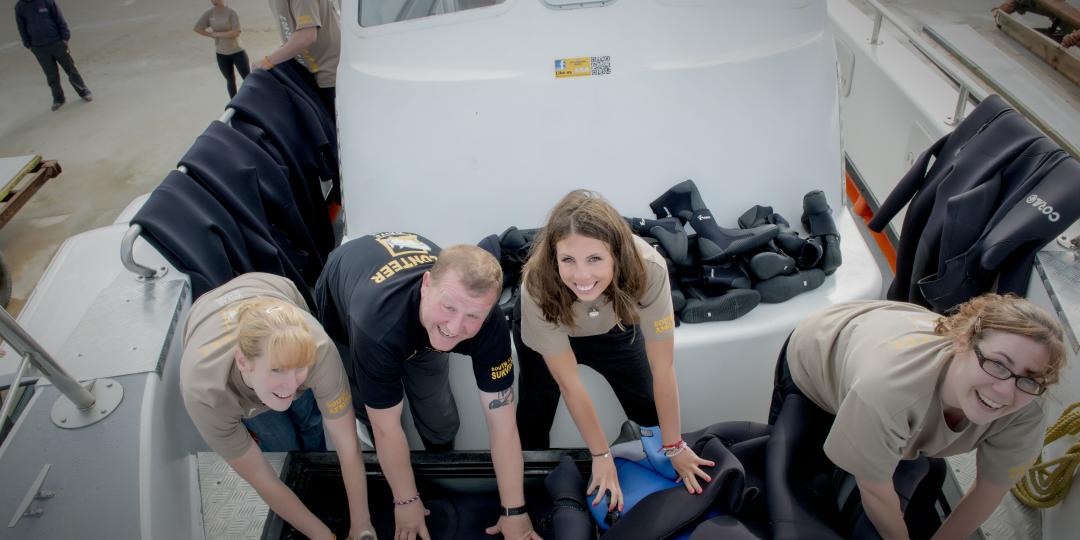Voluntourism continues to grow as a form of niche travel that is definitely going mainstream. While the actual term ‘voluntourism’ may have had its origins in the ‘gap-year’ school-leaver market, it has morphed into a form of travel and tourism that is applies to families, empty nesters, solo travellers and anyone who wants to give their time to benefit the environment or communities while on holiday.
Charmaine Beukes, MD of White Shark Projects (based in Gansbaai), says: “Volunteer travel provides people with the unique opportunity to explore and experience a destination through the eyes of the locals. It also affords the chance to meet and join forces with like-minded people from across the globe. Volunteering takes you out of the spectator seat and allows you to become integrated within the community where you choose to be.”
According to Beukes, White Shark Projects has taken the lead in establishing shark tourism as an educational experience, and there are a few options on offer. There is the option of a 24-hour experience for people visiting the Mother City but who don’t have much time. “But we would really like to recommend an extended stay of anything between two and six weeks.”
Hands-on learning is a big part of the experience, which includes lectures on shark-related topics, boat and cage preparation, and participation in data collection and collation among other ways to help.
Beukes says White Shark Projects is a great option for international tour operators looking to cater for the more environmentally conscious holiday-maker.
“This is the perfect solution for the traveller who wants to give back to the community, meet new people as well as interact on a more personal level with the locals,” says Beukes, “Over the years, the average age of a volunteer has changed from school and university leavers to a more mature group that wants to become part of a community rather than a visitor.”
Another option for tour operators looking to package unique wildlife voluntourism encounters, is the cheetah wilding and release programme on offer by Ashia Cheetah Sanctuary and Awareness Centre, situated outside Paarl in the Western Cape.
Chantal Rischard, co-owner and founder of Ashia says, ““Our conservation efforts primarily focus on the wilding and introduction of captive-bred cheetahs into the protected wild. The ultimate purpose is to strengthen the gene pool and to secure a viable cheetah metapopulation in South Africa, in order to prevent the further decline of cheetah numbers in the wild.”
While staying at Ashia, volunteers are trained by first working alongside the sanctuary staff. There are educational sessions with a focus on cheetah habitat and behaviour and wildlife conservation. Volunteers then have the option to extend their stay in South Africa by volunteering at one of the game reserves involved in the wilding and release programme. Generally, volunteers need to be available for three to four weeks but there are also flexible volunteering programmes on offer from two weeks to several months at a time.
Volunteers get to stay at Volunteer House, but there are also two cottages available for tour operators wanting to book clients on ‘Working Holidays’. Ashia is a Fair Trade and Tourism accredited Cheetah Centre.
Gondwana Game Reserve’s Wendy Rutherfoord says the reserve’s hands-on safari experience is a great option for those who want to take part and give back while enjoying the bounty of the environment.
“We have a fantastic three- and five-day conservation experience at our Tented Eco Camp that is very much like a volunteer vacation,” says Rutherfoord.
The camp is on the Garden Route and guests stay in the super-stylish eco-friendly tented camp in a protected fynbos valley with stunning views as far as the eye can see. There are five large tents on raised platforms, each with its own deck and private bathroom. Up to 10 guests at a time enjoy this exclusive camp.
Gondwana is known for its eco-tourism ethos, and at the Tented Eco Camp families, groups or individuals can take part in an eco-conservation experience that not only teaches them about Africa and its incredible wildlife and plant life, but also assists the Gondwana team in collecting important data. Guests are offered the opportunity to get involved with veld management, and to learn bush skills and interpretation. The findings from the programme are sent back to Gondwana’s conservation department to assist in improving and enhancing the existing reserve management plan.
In between bush walks, game drives and time to relax guests have the opportunity to play a role in the future vision of this incredible reserve.
























